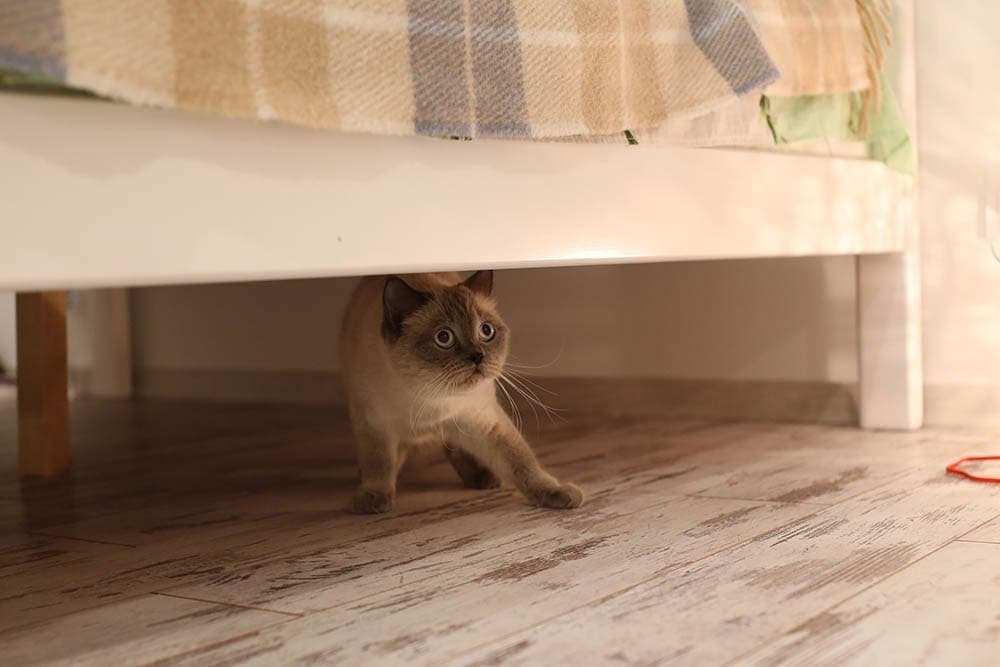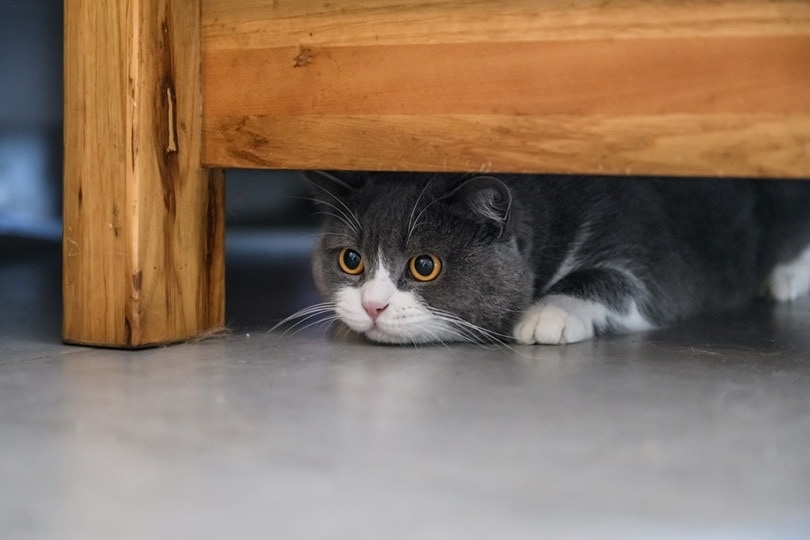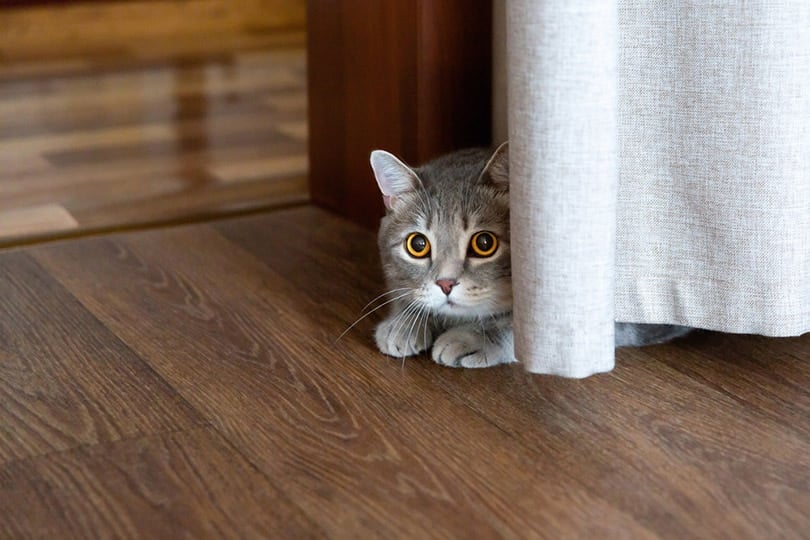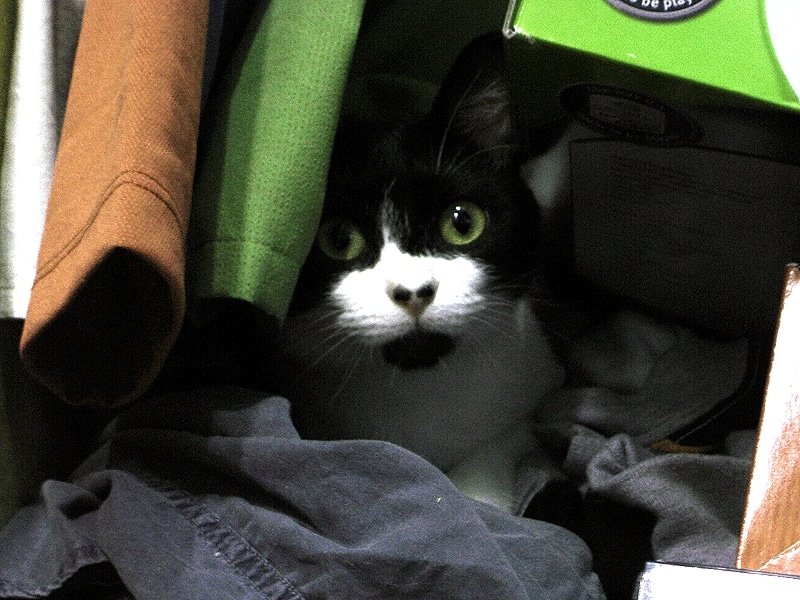If you have a cat that keeps running away, it can be a scary and frustrating experience, even if they always come back. If you are looking for ways to prevent this, you’ve come to the right place. Here are several reasons that your cat might be running away and what you can do to stop it.
The 12 Reasons Why Your Cat Might Run Away
1. Fear or Anxiety
Cats are susceptible to suffer from fear or anxiety when exposed to certain situations. Common triggers for noise phobia include fireworks, thunderstorms, construction, and noisy vehicles. Unfamiliar visitors can also upset your cat, as can environmental changes, like moving. In most cases your cat will react by hiding but running away is also possible.
Solution: To stop your cat from running away, try to identify these triggers and create a calm and safe environment. Provide hiding places, high hiding spots, and comforting scents, and gradually desensitize your cat to their triggers through positive reinforcement training. For example, plenty of early socialization can help them tolerate strangers better when adults.

2. Territory Disputes
Cats are territorial animals, especially unneutered males, and encountering other cats in their territory can lead to them running away, especially if the other cats are much bigger or have been there longer.
Solution: If other cats are in your neighborhood, your cat might feel threatened and choose to escape. Keep your cat indoors, and if they want to go outside, create a secure outdoor space where they can explore safely without encountering other cats, like an enclosed porch (catio).
3. Lack of Socialization
Cats that haven’t been properly socialized during their early development stages may feel uncomfortable around people, animals, or new experiences, making them more likely to want to flee, especially if you have a large family and other animals are in the house.
Solution: Gradually expose your cat to different situations, people, and pets to help them become more comfortable, especially when they are still a kitten. Use positive reinforcement, treats, and praise to associate these encounters with positive experiences. The more they get used to new things, the more comfortable they will feel.

4. Boredom
Cats need mental and physical stimulation to prevent boredom. Environmental enrichment is necessary for their well-being and to prevent undesirable behaviors, such as chewing on plants or scratching on furniture or decorations. Furthermore, they may end up seeking adventure by running away.
Solution: Provide interactive toys, scratching posts, puzzle feeders, and dedicated playtime to keep your cat engaged and entertained. Place plenty of perches around your home so they can look over their territory. Put a few in front of windows so they can look outside. Bird feeders can be a great way to keep your pet entertained while you work or take care of chores.
5. Medical Issues
Cats in pain or discomfort may exhibit changes in behavior. Many cats will hide away when sick, and they might run away if there is nowhere to hide.
Solution: It’s essential to rule out any underlying medical conditions when your cat is behaving abnormally. Take your cat to a veterinarian for a thorough examination to ensure that they are healthy. If a medical issue is detected, appropriate treatment can help alleviate the problem and reduce the chances of your cat running away.

6. Mating
Unneutered cats and unspayed females may roam in search of a mate, and it’s one of the most common reasons that cats run away and return later. The strong instinct to reproduce can cause some cats to travel more than a mile to find a suitable partner.
Solution: Spaying or neutering your cat will remove the need for them to seek out a mate, and they will be much less likely to run away from home. It can also help them avoid medical issues later in life.
7. Desire for Exploration
Cats are naturally curious animals and may want to explore their surroundings. If they find an open door or window, they may take the opportunity to run away without thinking about how they will get back.
Solution: Use security systems on windows and doors to prevent your cat from escaping. Additionally, ensure that your cat has plenty of things to do inside the home. Cat perches, tunnels, cardboard boxes, baskets, open dresser drawers, and similar items are wonderful places for your cat to explore, and you can move them around frequently to keep it fresh and prevent them from wondering what’s going on outside and running off.

8. Unfamiliar Environments
Moving to a new home or unfamiliar environment can be stressful for cats, leading them to run away in search of something familiar. In fact, if you only move across town, you might even find your cat at your old home.
Solution: When you move, take measures to help your cat adjust. Provide pheromone diffusers and familiar items like their bedding, toys, and scratching posts to create a sense of familiarity. Limit their access to new areas initially, gradually expanding their space as they get more comfortable and start to become curious about their new home.
9. Outdoor Dangers
The outdoors presents numerous dangers for cats, including traffic accidents and predators. If your outdoor cat is suddenly startled by a barking dog or braking truck, they might take off running, quickly finding themselves far from home and too frightened to return.
Solution: To protect your cat, keep them indoors, and provide a secure outdoor enclosure where they can safely enjoy nature. Supervised outdoor time on a leash is also an option, as is walking them in a cat stroller—if you can convince them to try it.

10. Predatory Instincts
One common reason that cats run off is to hunt for prey. They are instinctive hunters and will chase after almost any creature that crosses their path. If there is a flock of ducks or large groups of other small animals, your cat might spend considerable time stalking and hunting them.
Solution: If your cat frequently runs away to pursue prey, you’ll need to help them stay indoors to prevent harm to themselves or wildlife. Double-check all exits in the house to ensure that your cat can’t sneak out, and make sure their catio or cat stroller is escape-proof.

Conclusion
While your cat may have run away for multiple reasons, if they returned, they were likely out looking for a mate or hunting prey that caught their attention. Cats that leave due to anxiety, territorial disputes, or medical issues might not come back. The best way to keep your pet from running off is to get them spayed or neutered and to keep them in as indoor cats. If your cat likes to spend time outdoors, try screening the porch, building a catio, or using an outdoor cat house that can be closed. They may also enjoy watching birds at a feeder through a window while they relax on a cat perch.
Featured Image Credit: Zossia, Shutterstock











